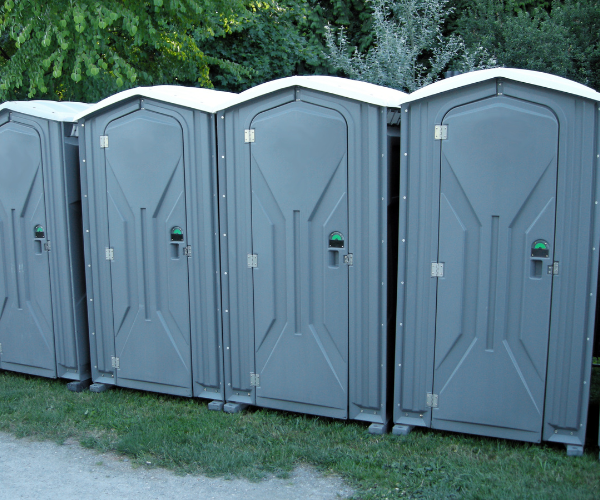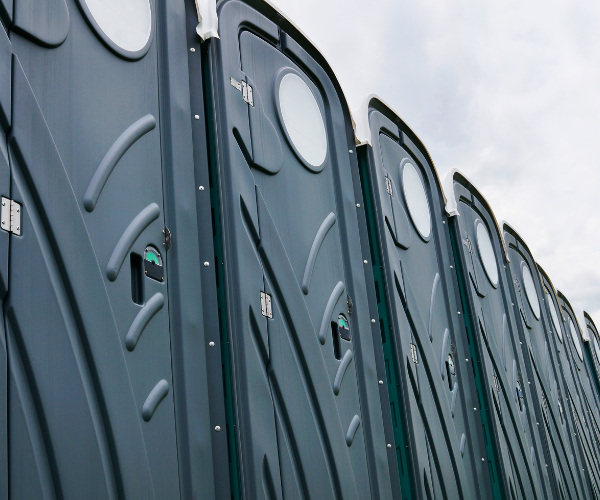Portable Toilets present numerous eco-friendly advantages that cater to both environmental conservation and sustainable practices. First and foremost, modern Portable Toilets employ waterless technology, drastically reducing water consumption compared to traditional facilities. This conservation of water is particularly beneficial in areas prone to drought or with limited water supply.Additionally, Portable Toilets efficiently manage waste by utilizing chemicals that break down materials, making it easier and less harmful for disposal processes. This minimizes the environmental impact that would otherwise occur with direct discharge into sewage systems. The materials in Portable Toilets are also increasingly manufactured from recycled or sustainable resources, reducing the carbon footprint associated with production.Deployment of Portable Toilets during events or construction sites helps preserve natural areas by preventing the indiscriminate disposal of human waste. This is crucial for maintaining the integrity of ecosystems and landscapes. These units also encourage responsible sanitation practices in regions that lack proper plumbing infrastructure, improving public health and hygiene standards. Furthermore, the compact and mobile nature of Portable Toilets allows for easy transportation and placement, minimizing disturbance to the surrounding environment during setup and removal.Overall, opting for Portable Toilets not only addresses immediate sanitation needs but also contributes to a broader, eco-friendly agenda. Through water conservation, waste reduction, and sustainable manufacturing, these units play a vital role in fostering environmental stewardship while meeting diverse needs.

Portable Toilet Rentals in Cave Spring, Georgia
Call today for a free quote (770) 215-0134
Portable Toilet
Fast, Easy, & 100% Free To Get Started
Over 20 Years of Expertise
For over 20 years, our company has been a proud member of the Cave Spring community, offering quality Portable Toilet services. Our dedication to excellence and local ties reflect our commitment to customer satisfaction.
Committed to Quality Service
We promise exceptional service, ensuring each Portable Toilet rental meets the highest industry standards. We prioritize delivering clean, dependable, and efficient solutions tailored to your specific requirements.
Swift and Reliable Delivery
Our Portable Toilet services promise quick and efficient delivery, ensuring your site is equipped exactly when you need it. With our prompt services, downtime is minimized, keeping your events and projects running smoothly.
Convenient Portable Toilet Solutions in Cave Spring
Call for a Free Quote Today
(770) 215-0134
Located in Cave Spring, our Portable Toilet company prides itself on being a dependable, locally owned business that our community can count on. Our reliable services cater to a variety of events, including construction sites, parties, festivals, and weddings, ensuring clean and accessible facilities wherever you are. Known for our professionalism and attention to detail, we serve not just Cave Spring but neighboring areas as well. Our commitment to quality and customer satisfaction guarantees a pleasant experience every time. Whether you are organizing a large festival or an intimate wedding, trust us to provide the sanitation solutions you need. With years of experience under our belt, we are well-equipped to meet and exceed your expectations.


Our standard porta john rental units are durable and reliable for any commercial build site, housing development, public works project, or remodel job.Features include dome lighting, grated floors, and an “In-Use” locking mechanism for privacy and comfort. Regularly maintained, inspected, and cleaned by FusionSite at your location.

Developed as an alternative to full ADA-compliant restrooms, the Liberty is a spacious, wheelchair-accessible unit that can also be promoted as a family-sized restroom. Includes a patented flat-floor system for easy wheelchair access and maneuverability.Handrails, paper holder, and rotary latch are designed for simple, intuitive end-user operation.

Portable hand washing stations are essential for keeping your work site sanitary and clean. Features hands-free foot pumps, liquid soap, and paper towels.Perfect for job sites without water hookups, these units can handle hundreds of washes between services.
We Proudly Serve
Standard Portable Toilets
Standard Portable Toilets offer clean, efficient sanitation solutions for various occasions and locations across Georgia Container.
High Rise Portable Toilets
High Rise Portable Toilets are perfect for construction sites and events in Cave Spring, providing elevated sanitation solutions.
Restroom Trailers
Restroom Trailers in Cave Spring offer luxurious, spacious sanitation options tailored for any special event by Georgia Container.
Roll off Dumpsters
Roll off Dumpsters at Georgia Container offer waste management solutions tailored for construction and large events in Cave Spring.
Septic Tank Cleaning
Septic Tank Cleaning at Georgia Container in Georgia offers comprehensive services ensuring optimal system health and efficiency.
Grease Trap Cleaning
Grease Trap Cleaning in Cave Spring provides essential maintenance services, ensuring efficient operations for local businesses.
Fencing & Barricades
Fencing & Barricades service at Georgia Container offers secure, reliable solutions for events and construction sites across Georgia.
Residential Storage
Residential Storage in Georgia, at Cave Spring, provides secure and flexible storage solutions for personal and household needs.
Cave Spring Portable Toilet Services
Obtaining a quote and arranging delivery for Portable Toilets is a seamless process with us. Our customer-friendly approach means you can conveniently request a quote online or over the phone, ensuring you're well-informed about costs upfront. We understand the importance of timely delivery and have streamlined our operations to cater to urgent needs efficiently. Our team is equipped to handle any logistic challenge, ensuring that your rental arrives when you need it, regardless of how remote your location might be. The ease of doing business with us is a testament to our dedication to customer satisfaction and operational efficiency. From the moment you contact us, our goal is to make the entire experience as smooth and effective as possible, ensuring you receive your necessities without any added stress. In Cave Spring and nearby areas, we are recognized for our ability to deliver not just rentals, but peace of mind, right to your doorstep.

Nestled in the charm of Cave Spring, our Portable Toilet services enhance the appeal of local gatherings and events. Whether it's the renowned Cave Spring Arts Festival, a nature outing, or a visit to the historic Rolater Park, our solutions provide the necessary convenience and reliability. Local events become more enjoyable with our clean and accessible options that integrate seamlessly into any setting, ensuring guests' comfort. Our commitment to quality and customer satisfaction positions us as the premier choice for sanitation needs in this vibrant and natural region. Whether in close proximity to nature or during community activities, our Portable Toilet services stand as a testament to enhancing event experiences, making every occasion more delightful and worry-free.
Our company stands as the premier choice for Portable Toilet services in Cave Spring, driven by a steadfast commitment to quality and customer satisfaction. With strong community ties, we deeply understand the local landscape and the unique needs of our clients.We offer clean, reliable, and efficient services, ensuring top-tier sanitation solutions for every event or project. Our reputation here reflects our expertise and dedication to exceeding customer expectations.By choosing us, you secure a stress-free experience, supported by years of industry knowledge and a genuine concern for delivering the best possible service.
Our company's commitment to delivering swift and reliable Portable Toilet services ensures that your needs are addressed promptly and with precision. By executing carefully coordinated operations, we ensure on-time deliveries and installations, reducing potential disruptions.With years of industry expertise, we proactively tackle logistical challenges, providing seamless service. Rely on us for prompt, dependable solutions tailored to meet the fast-paced requirements of your projects and events.
Discover More About Our Portable Toilets in Cave Spring
Renting a Portable Toilet in Cave Spring is designed to be straightforward and hassle-free. Customers can access online forms located at both the top and bottom of the web pages designed for easy navigation. Simply fill out the form with your basic contact information—first name, last name, phone number, and email address—and submit it to initiate the process. For added convenience, there are 'Get A Quote' buttons strategically placed throughout our website, allowing you to request information and quotes effortlessly.Once your information is received, our customer service team will promptly process your request, ensuring that you receive a quote tailored to your specific needs and event requirements. Our team will collaborate with you to determine the best solutions for your event size and scope, whether it be a small gathering or a large outdoor festival. We pride ourselves on our ability to provide flexible and personalized services that cater to all sorts of sanitation needs. The collected information helps ensure that we can accurately assess your requirements and offer the most suitable options for delivery and setup.Throughout the entire rental process, expect clear communication and responsive service from our staff, as we prioritize making your experience as smooth and efficient as possible. Our reputation in Cave Spring and surrounding areas is built on delivering top-notch service through every step, from inquiry to installation. Choose us for your next event and experience firsthand our dedicated approach to customer satisfaction and convenience.
When ordering Portable Toilets, customers can typically expect a delivery timeframe designed to accommodate the urgency and specific requirements of your event or project schedule. Upon establishing your needs, our team will coordinate with you to ensure a seamless delivery process, usually offering various scheduling options to fit your timeline.Our efficient logistics system enables us to provide quotes that include precise delivery details, taking into account the location-specific challenges that may arise in Cave Spring or nearby regions. Typically, our deliveries can be arranged swiftly within standard business timelines, though we also offer expedited services for those in immediate need.Our promise is to minimize any stress related to event preparations by delivering Portable Toilets in a timely manner, backed by clear communication from order placement through to completion. If any unforeseen circumstances arise, we are flexible and capable of adapting to assure on-time arrivals. Another factor influencing delivery times can be the scale and complexity of your order, with larger orders potentially requiring additional coordination.Rest assured, our commitment to outstanding customer service translates into reliable delivery practices that align with your event's specific timeline requirements, making sure your Portable Toilet needs are met precisely when and where they are needed.
Yes, we are equipped to service a wide array of events and construction site needs with our versatile and comprehensive range of sanitation products and services. Whether you are organizing a bustling festival, an exciting sporting event, or planning an elegant wedding, we have the perfect solutions tailored for your specific requirements. Our offerings include luxury restroom trailers, standard porta potties, and ADA-compliant units to ensure accessibility for all guests.In addition to these, we also provide roll-off dumpsters for efficient waste management, fencing, and barricades to enhance security and crowd control, as well as holding tanks and portable sinks for comprehensive sanitation support. Our portable sinks and hand sanitizer stations help maintain hygiene standards high, even in outdoor or remote locations.With a commitment to quality and flexibility, our services are designed to handle events of any size, from intimate family reunions to large-scale corporate or community gatherings. Throughout our offerings, we prioritize ensuring a seamless and worry-free experience for our clients, allowing you to focus on the success of your event while we manage your sanitation needs.

